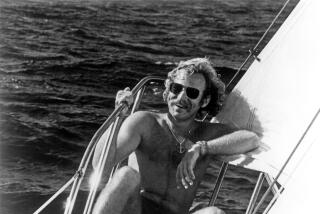Album review: Beck’s ‘Morning Phase’ a refreshing, superior follow-up
- Share via
Beck made his name as a recycler, a smart, savvy searcher known for finding new value in old things. So it makes sense that the artist responsible for “Mellow Gold” and “Odelay,” both high points of mid-’90s cut-and-paste pop, would eventually get around to recycling himself.
That’s more or less what Beck does on his latest album, “Morning Phase.” With the same downbeat acoustic vibe and many of the same players, the new record serves as a kind of spiritual sequel — a “companion piece,” his camp calls it — to 2002’s “Sea Change,” on which the singer broke from his established collage aesthetic to offer up a dozen slow-and-low folk songs about the pain of heartache.
True to his transformer’s nature, the sequel is better than the original.
PHOTOS: Concert photos by the L.A. Times
For all that connects “Morning Phase” to “Sea Change,” the two records come out of very different circumstances. On the earlier album, Beck was pondering the end of his relationship with a longtime girlfriend, but he was also looking for a bridge to the next phase of his career after 1999’s polarizing absurdist-soul fantasia “Midnite Vultures.”
Now he’s a married 43-year-old father of two whose commercial success and tastemaker acclaim have afforded him the leeway to do pretty much whatever he wants. Though “Morning Phase” is Beck’s first studio record since “Modern Guilt” in 2008, it follows a smattering of left-field projects that speak to his prestige: “Song Reader,” a collection of tunes issued only as sheet music; writing and production gigs on records by Stephen Malkmus and the Lonely Island; an elaborate performance of David Bowie’s “Sound and Vision” sponsored by the carmaker Lincoln.
You can hear the effect of that privileged stability all over “Morning Phase,” which employs a similar palette as “Sea Change” — acoustic guitar, spacey synth, string arrangements by Beck’s father, David Campbell — to achieve a far lusher sound, with stronger melodies, deeper grooves and more expressive singing.
Beck’s bassist, Justin Meldal-Johnsen, recently told The Times that the new album is “minimal beyond anything we had done before,” but even if that’s true in some technical sense, it’s not at all the way “Morning Phase” works. The trippy keyboards in “Unforgiven,” the unexpected chord changes in “Morning” — these handsome details provide more sensation, not less.
INTERACTIVE: Discover songs of L.A.
Though much of Beck’s early music is as appealing now as it was when it was released, “Sea Change” suffers considerably from the comparison with “Morning Phase”; the older songs feel punishingly drab, while Beck sounds like he’s half-asleep in most of them.
Given his emotional state at the time he made it, perhaps that lifelessness was his goal. (The album does contain a song called “Already Dead.”) But it’s no match for the luscious sensuality of the new “Heart Is a Drum” or the dreamy thrum of “Blue Moon” — even if it’s hard to know where this family man and constant collaborator is coming from when he insists in the latter, “I’m so tired of being alone.”
Which means that the only basis for ranking “Sea Change,” frequently described as a masterpiece, over “Morning Phase” is a bad old-fashioned authenticity fetish — the belief that drawing directly on real-life experience (as with Beck’s breakup) necessarily yields more meaningful music than that which pulls from imagination or invention.
But if Beck has taught us anything over the course of his hopscotching two-decade career, isn’t it to distrust that quaintly outmoded idea?
What feels far more important than whether he actually saw “the sleet that rests upon the quiet street we’re standing on” in “Say Goodbye” is the sense the song gives of that sleet and that street. Even more important than that, perhaps, is the lack of particulars in the song regarding both.
PHOTOS: Unexpected musical collaborations
One reason “Sea Change” might sound so squeezed-dry is because we know too much about its origin. “Morning Phase,” by contrast, is full of fuzzy West Coast philosophizing that rarely gives up anything easily linkable to Beck’s celebrity existence.
“We could come to understand what’s wrong is right as rain,” he muses in “Blackbird Chain,” which I think we can all agree is preferable to whatever he might’ve written explicitly about the back injury he said he suffered after “Modern Guilt.”
Before “Sea Change” and its perceived confessions, of course, that fuzziness was Beck’s default mode. “A devil’s haircut in my mind” — how exactly does that work?
Yet somehow we began to expect something different from Beck, something more knowable, once he had his guitar strapped on. Over music that feels lighter than air even as it takes on shades of gloom, the comfortable fortysomething dad on “Morning Phase” refreshes that familiar pose with some welcome mystery.
Beck
“Morning Phase”
(Capitol)
Three stars
More to Read
The biggest entertainment stories
Get our big stories about Hollywood, film, television, music, arts, culture and more right in your inbox as soon as they publish.
You may occasionally receive promotional content from the Los Angeles Times.











